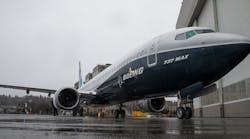The grounding of Boeing Co.’s 737 Max jet will have ripple effects – not all of them bad – across an aviation industry that’s been a steadying force for industrial conglomerates. The U.S. Federal Aviation Administration on March 13 followed virtually every other relevant regulator in issuing a precautionary ban of the Max after a combined 346 people died in two fatal crashes over the past five months.
On the one hand, with the Boeing best-seller out of commission, carriers such as Southwest Airlines Co. and American Airlines Group Inc. may be forced to turn to older aircraft to maintain capacity, notes Bloomberg Intelligence analyst Douglas Rothacker. Older planes are more apt than newer ones to require maintenance and repair work, which is the biggest profit driver for most suppliers.
The longer the delay drags on, though, the bigger the risk that Boeing has to re-calibrate its target for producing 57 planes a month, potentially hamstringing a top source of revenue growth for parts makers such as Spirit AeroSystems Holdings Inc., United Technologies Corp., Honeywell International Inc. and General Electric Co. House lawmakers briefed by aviation regulators said the grounding may last at least through April. The worst case scenario is a widespread canceling of orders that erodes both Boeing – and its suppliers’ – backlog.
Acting FAA administrator Daniel Elwell (the official job has been open for 14 months) said Wednesday that the decision to ground the Max was based on satellite flight-tracking data and other undisclosed evidence that suggested the Ethiopian Airlines crash on Sunday may have similarities to a fatal Lion Air incident in October. There’s still no explicit confirmation of a link between the two, but for Boeing and its suppliers, it would be better – not reputationally, but financially – if it’s the same problem that felled both planes, rather than two different engineering issues that need correcting. Either way, there will be disruption.
The Lion Air crash has been tied to a flight-control system that Boeing installed when it retrofitted the 737 design to accommodate larger, more fuel-efficient engines. To guard against loss of lift, the system will push the plane’s nose down, but erroneous data from a sensor seems to have caused the software to misfire. Of note: The sensor in question is made by United Technologies, according to Airframers.net, while the data are fed into computers made by Honeywell International Inc. for the plane.
Boeing’s proposed fix for the flight-control programming, known as the Maneuvering Characteristics Augmentation System, is relatively easy and inexpensive. An update to the software reportedly takes about an hour to download and will require the system to compare data from two sensors to help eliminate bad readings, and will limit the force with which it can force the plane to dive. But the software changes were delayed by a technical debate between the FAA and Boeing over how extensive the fix should be, as well as the government shutdown, according to the Wall Street Journal.
Elwell denied that the shutdown was a factor, but either way, if the same flight-control system is found to be at fault in the Ethiopian Airlines crash, the FAA will have to explain why it didn’t act more quickly on requiring a fix that could have saved 157 people’s lives. The second crash could up the stakes for what kind of fix will pass muster. Boeing at the very least may be required to undergo time-consuming flight tests and other certification procedures. It’s also not out of the realm of possibility that regulators take a closer look at the decision to jury-rig an older plane design to accommodate the new engines, rather than start from scratch. Customers are apt to hit the pause button on their Max deliveries during this stretch, which will require Boeing to carry extra inventory and endure the associated drag on its cash flow.
Boeing showed a willingness to shoulder this burden in 2013, when the 787 Dreamliner was grounded for 123 days over concerns about lithium-ion batteries. If it does that again this go-around, that should limit the impact for suppliers, which will keep shipping parts to Boeing as usual. But this dynamic becomes increasingly untenable for Boeing from a cash-flow perspective the longer the grounding goes on. In a statement yesterday, Fitch Ratings said a grounding beyond several months could impact Boeing’s credit rating. That’s where you could start to see production rollbacks and the fallout for suppliers could turn uglier.
Canceled orders pose a more direct hit to production targets. PT Garuda Indonesia said Thursday that’s it’s lost confidence in the Boeing Max jet and wants to cancel its order. Lion Air also is planning to drop a $22 billion order for the Max, while Kenya Airways Plc and VietJet Aviation JSC are reviewing whether they want to move forward with planned orders. Some of these airlines have said they may switch their business to Airbus SE, but that’s not the easiest thing to do in a timely fashion, given the large backlog for Boeing’s biggest competitor. Some Boeing suppliers are also Airbus providers and may benefit from the business either way, but a rejiggering of orders seems likely to create pile-ups along a supply chain that is already struggling to meet aggressive production targets.
The extent to which the supply chain is disturbed will be highly dependent on the outcome of the investigation into the Ethiopian Airlines crash and the degree to which Boeing can quickly restore confidence in the plane, so most of these scenarios remain hypothetical. All in, the direct impact on Boeing suppliers may be minimal, but it's a looming point of worry for a sector that hasn't had much of anything to worry about during the past few years.
By Brooke Sutherland



